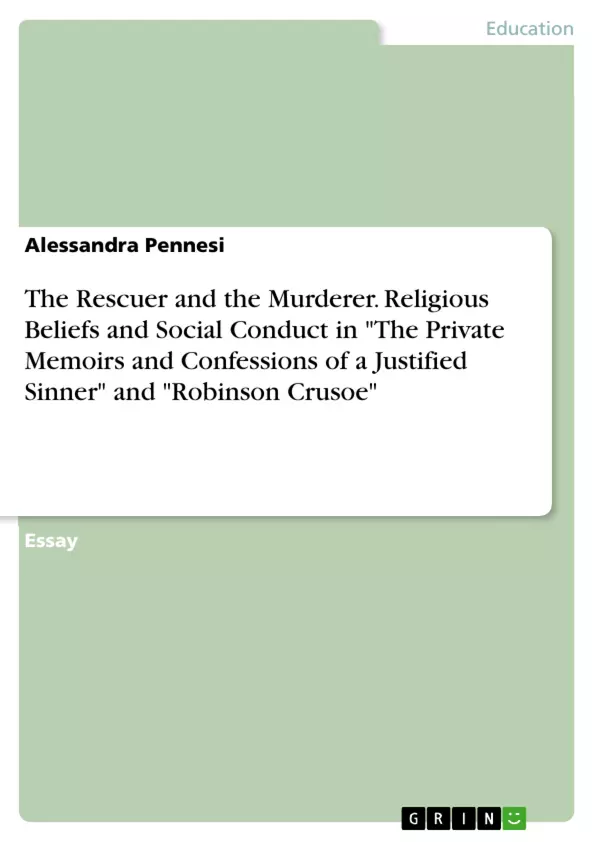The question of religion is one that necessarily brings with it a series of issues related to the understanding of morality and of social conduct. The protagonists of The Private Memoirs and Confessions of a Justified Sinner and of Robinson Crusoe are both characters which seem to have come, although upon different terms, into a privileged relationship with God. Here I want to explore how the awareness of their privileged spiritual status influences the way they perceive themselves and the way they relate to the members of their society. We will see also how Robert Wringhim and Robinson Crusoe actually respond to two opposite moral codes which stem from their different ability for self-analysis and genuine introspection.
Inhaltsverzeichnis (Table of Contents)
- The Rescuer and the Murderer: Religious Beliefs and Social Conduct in The Private Memoirs and Confessions of a Justified Sinner and Robinson Crusoe
- Crusoe's Spiritual Change
- Subjugating the Wilderness and Material Sustenance
- Emotional Depth and Reinterpreting Life as a Providential Plan
- Resigning to God's Will and Acknowledging Powerlessness
- Crusoe's Secular Attitude and Tolerance
- Crusoe's Monarchy and the Puritan Concept of the Self
- Robert's Tarnished Spirituality and the Notion of Predestination
- Inner Fracture and the Religious Duty vs. Civil Law
- Yielding to Gil Martin's Argumentations and the "Abstract Speculative Principle"
- Fanatic Rejection of Diversity and the Primal Cause of Violence
- Robert's Inability to Repent and the Certainty of Salvation
- Crusoe's Enlightened Rationality and Approach to Faith
- Intellectual Colonization and a Newly Discovered Humanism
Zielsetzung und Themenschwerpunkte (Objectives and Key Themes)
This essay explores the influence of religious beliefs on the protagonists' understanding of morality and social conduct in two classic novels, The Private Memoirs and Confessions of a Justified Sinner and Robinson Crusoe. It analyzes how their perceived privileged relationship with God shapes their self-perception and interactions with society, as well as their responses to contrasting moral codes stemming from their introspective abilities.
- The impact of religious beliefs on individual morality and social conduct
- The interplay between religious faith and self-perception
- The role of introspection and self-analysis in shaping moral values
- Contrasting responses to moral codes in different contexts
- The influence of religious beliefs on cultural and social relationships
Zusammenfassung der Kapitel (Chapter Summaries)
The analysis begins by examining Crusoe's spiritual journey in Robinson Crusoe, highlighting his initial focus on subjugating the island's wilderness to ensure his survival. However, his isolation triggers a shift in perspective, leading him to acknowledge his moral fallibility and ultimately resign to God's will. This shift influences his attitude towards the cannibals he encounters, demonstrating a newfound understanding and tolerance.
In contrast, Robert Wringhim's spirituality in The Private Memoirs and Confessions of a Justified Sinner is marred by predestination and antinomianism, leading him down a path of violence and self-justification. The essay explores the complexities of his internal conflict between religious duty and civil morality, highlighting the dangerous consequences of subscribing to extremist discourses and the oversimplification of good and evil.
Further analysis reveals how Crusoe's enlightened rationality shapes his approach to faith, even as he struggles with the concept of other religions. His newly discovered humanism prevents him from engaging in violence based on cultural differences, setting him apart from Robert's fanaticism.
Schlüsselwörter (Keywords)
The key themes explored in this essay revolve around religious beliefs, morality, social conduct, self-perception, introspection, contrasting moral codes, cultural and social relationships, and the interplay between faith and action. It focuses on the contrasting personalities and actions of two protagonists, highlighting their diverse responses to their perceived relationship with God and the implications for their interactions with society. Important works analyzed include The Private Memoirs and Confessions of a Justified Sinner by James Hogg and Robinson Crusoe by Daniel Defoe. Key figures include Robert Wringhim, Robinson Crusoe, and Friday.
Frequently Asked Questions
How does religion influence Robinson Crusoe's conduct?
Initially focused on survival, Crusoe's isolation leads to a spiritual awakening where he resigns to God's will, which eventually fosters tolerance and humanism in his social interactions.
What is the "Justified Sinner" in James Hogg's novel?
The protagonist, Robert Wringhim, believes he is one of the "elect" according to the doctrine of predestination, leading him to believe he cannot sin and thus justifying his violent actions.
How do the moral codes of Crusoe and Robert Wringhim contrast?
Crusoe uses enlightened rationality and genuine introspection to find a moral path, while Robert yields to fanatical arguments and an "abstract speculative principle" that rejects diversity.
What role does predestination play in the novels?
In Hogg's novel, predestination is a primal cause of violence and inner fracture. In Defoe's work, it is reinterpreted as a providential plan that guides Crusoe's survival and change.
Can Robert Wringhim repent for his actions?
No, his fanatical belief in the certainty of his salvation and his inability for genuine self-analysis prevent him from feeling remorse or repenting for his crimes.
How does Crusoe's attitude toward faith differ from Robert's?
Crusoe's faith is tempered by a newly discovered humanism and rationality, whereas Robert's faith is characterized by a fanatical rejection of anything outside his narrow religious duty.
- Citar trabajo
- Bachelor of Arts (English- German) Alessandra Pennesi (Autor), 2019, The Rescuer and the Murderer. Religious Beliefs and Social Conduct in "The Private Memoirs and Confessions of a Justified Sinner" and "Robinson Crusoe", Múnich, GRIN Verlag, https://www.grin.com/document/906430



